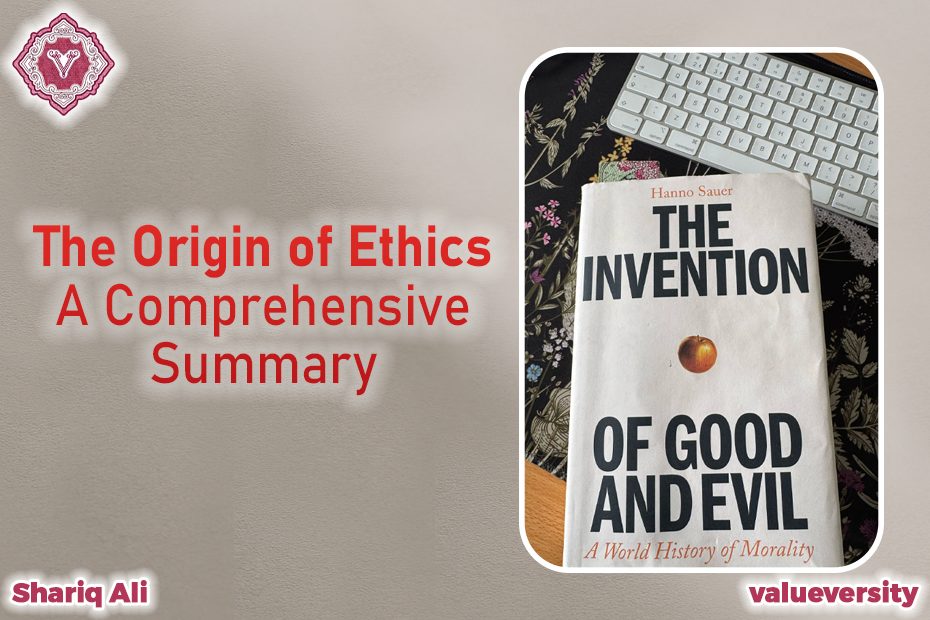The Origin of Ethics: A Comprehensive Summary
(In Light of Hanno Sauer’s Book and Modern Research)
Research and Compilation:
Shariq Ali
Valueversity
Summary:
The origin of ethics has long been a subject of debate in philosophy, anthropology, evolutionary biology, psychology, and theology. Hanno Sauer’s book The Invention of Good and Evil and recent research agree that ethics is not an absolute or divine truth, but rather an evolving human invention shaped by survival, social needs, and historical experiences.
- Evolutionary Foundations: Cooperation for Survival
Both Sauer’s book and modern research emphasize that the roots of ethics lie in human evolution. When our ancestors moved from small groups into larger social communities—especially as they left the forests of East Africa for open and uncertain environments—cooperation became essential for survival.
Emotions like empathy, fairness, and mutual trust played a critical role in building social structures. These basic “moral instincts” can also be partially observed in animals, forming the earliest foundations of human ethics.
- Religious Concepts and the “Moral God”
As humans developed agriculture, settlements, and urban societies, animal instincts and tribal customs were no longer sufficient. Increasing inequality and complexity in human society gave rise to the concept of a “moral god”—a deity who rewards good and punishes evil, even after death.
This idea became a powerful tool for establishing moral codes within religion. The divine aspect of law and justice helped maintain social order and discipline.
- The Middle Ages and the Modern Era: From Tribal to Universal Ethics
Over the past thousand years, especially in Western Europe, moral thought underwent a significant shift. According to Sauer’s research, reforms within the Catholic Church during the Middle Ages—such as the ban on marriages between close kin—helped weaken tribal loyalties and encouraged broader social cooperation.
This shift gradually led to what is now known as “WEIRD” morality—Western, Educated, Industrialized, Rich, and Democratic—marked by ideals of individual equality, human rights, and justice.
- Ethics as a Human Construct, Not a Scientific Fact
Sauer stresses that ethics is not a scientific discovery but a human narrative—a way to organize social life. Our sense of guilt, demand for justice, and concept of punishment are results of evolutionary and cultural factors, not universal truths.
This idea is known as moral constructivism—that humans are the creators, not the discoverers, of moral principles.
- Challenges of the Modern World: Crisis or Transformation?
The global, digital, and multicultural nature of today’s world has raised many new ethical questions—such as environmental protection, artificial intelligence, biotechnology, and digital freedom.
Sauer acknowledges this “moral confusion,” but he also argues that core moral values—like empathy, justice, and human dignity—are still alive, though expressed differently across cultures.
- Moral Progress: Slow, Uneven, but Real
Sauer and other scholars agree that while moral progress is slow and complex, it is very much real. The abolition of slavery, women’s rights, child protection, and animal welfare are all indicators of the expanding circle of human morality.
This proves that humans not only have the capacity to learn new things, but also to envision and create a better world.
Conclusion:
Ethics is an evolutionary, cultural, and inventive construct of human history. It began as a tool for cooperation and survival, was later systematized through religion, philosophy, and law, and now faces new challenges in the modern world.
Hanno Sauer’s research invites us to see ethics not as a sacred or immutable truth, but as a flexible human project—one that we all can continue to improve with time.
In short:
Ethics was not discovered—it was created. And humanity is still writing its story.
